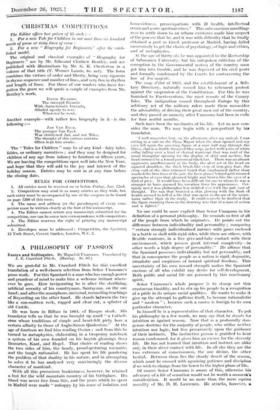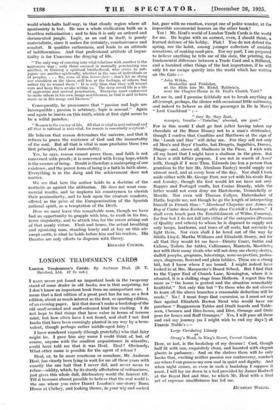A PHILOSOPHY OF PASSION
Essays and Soliloquies. By Miguel di Unamuno. Translated by J. E. Crawford Flitch. (Harrap. 8s. 6d.) WE are grateful to Mr. Crawford Flitch for this excellent translation of a well-chosen selection from Seiior Unamuno's prose work. For this Spaniard is a man who has enough power and grandeur of mind to make him a welcome irritant where- ever he goes. How invigorating he is after the sterilizing, artificial serenity of his countryman, Santayana, on the one hand ; and after the amorphous, universal, reconciling teachings of Keyserling on the other hand. He stands between the two like a sun-smitten rock, rugged and clear cut, a splinter of old Castile.
He was born in Bilbao in 1864, of Basque stock. Ilis translator tells us that he was brought up amid " a Catholi- cism whose traditions of simple and heart-felt piety bore a certain affinity to those of Anglo-Saxon Quakerism." At the age of fourteen we find him reading Ossian ; and from this he turned to metaphysics, elaborating in a twopenny notebook a system of his own founded on his boyish gleanings from Descartes, Kant, and Hegel. That choice of reading shows the two sides of him, the heady, proud-gesturing romantic, and the tough rationalist. He has spent his life pondering the problem of that duality in his nature, and in attempting to solve it he has analysed very convincingly the diverse character of mankind.
With all this precocious bookishness, however, he retained a lust for the wild mountain country of his birthplace. His blood was never free from this, and the years which he spent in Madrid were made " unhappy by his sense of isolation and homesickness, preoccupations with ill health, intellectual strain and acute spiritual crises." This subconscious unwilling- ness to settle down to an urbane existence made him suspect of the powers that be, and it was with difficulty that he finally obtained a post as Greek professor at Madrid, having failed successively to get the chairs of psychology, of logic and ethics, and of metaphysics.
At the age of thirty-six he was appointed to the Rectorship
of Salamanca University, but his outspoken criticism of the corruption in the Governmental system of the country soon got him into trouble, and he was deprived of his civil posts and formally condemned by the Courts for contravening the law of lese-majeste.
The coup d'etat of 1923, and the establishment of a Mili- tary Directory, naturally roused hint to vehement protest against the suspension of the Constitution. For this he was banished to Fuerteventura, the most remote of the Canary
Isles. The indignation roused throughout Europe by this arbitrary act of the military rulers made them reconsider the advisability of driving their great men out of the country, and they passed an amnesty after Unamuno had been in exile for four restful months.
Such have been the mechanics of his life. Let us now con- sider the man. We may begin with a pen-portrait by his translator.
" I well remember how, on the afternoon after my arrival, I was sitting in a cafe on the Plaza Mayor when the door opened and my eyes fell upon the arresting figure of a man half-way through tho fifties, clad in a double-breasted blue serge jacket with a rim of white collar falling over a kind of clerical waistcoat that was void of the usual triangular opening for the display of shirt and necktie, his head crowned by a round parsonical black hat. There was an almost aggressive annamcement of the body, the alert set of the head on squared shoulders, the thick brush-hke crop of iron-grey hair, the crisp curl of the close-trimmed beard that emphasized rather than masked the firm lines of the jaw, the keen glance behind gold-rimmed spectacles of eyes that gleamed bright and brown like the eyes of a bird of prey. It would have been difficult for one to whom he was a stranger to have guessed his vocation from his appearance. Cer- • tainly never was philosopher less sickbed o'er with the pale east of thought. The tan that bronzed a skin glowing with the flush of health seemed to tell of a life that was spent in the air of the moun- tains rather than in the study. It could scarcely be doubted that the figure standing there in the doorway was that of a man of action and a fighter."
No one could be more explicit than Seilor Unamuno in his definition of a personal philosophy. He reminds us first of all of the people from which he originates. Ile points out the difference between individuality and personality ; comparing " certain strongly individualized natures with gases enclosed in a bottle or shell with rigid sides, while there are others, with
flexible contours, in a free give-and-take contact with their environment, • which possess great internal complexity-4n other words a high degree of personality." He affirms that the Spaniard possesses individuality but not personality, and that in consequence the people as a nation is rigid, dogmatic, ritualistic and suspicious of inward spiritual freedom. This uncertainty of his own inward strength makes the Spaniard envious of all who exhibit any desire for self-development, Both public and social life arc poisoned by this reactionary
spirit.
Seiior Unamuno's whole purpose is to stamp out this
crustacean timidity, and to stir up his people to a recognition of a pride in its unique racial qualities. lie wants to make it • give up the attempt to gallicize itself, to become rationalistic
and " modern " ; because such a course is foreign to its own particular character.
In himself he is a representative of that character. To put his philosophy in a few words, we may say that he stands for intuition as against reason. Now that is a profoundly dan- gerous doctrine for the majority of people, who utilize neither intuition nor logic, but live precariously upon the guidance of their instincts. The instinctive person is gratified to hear reason condemned, for it gives him an excuse for the slovenly life. He has not learned that intuition and instinct are alike only in their direct contact with life. In all else they are the two extremes of consciousness, the one divine, the other
bestial. Between them lies the cloudy desert of the reason, which must be crossed with agonizing patience and discipline if we wish to change from the lower to the higher plane of life.
Of course Selior Unamuno is aware of this, otherwise his advocacy of a life of sensation would not be worth a moment's consideration. It would be no more than the mere equine
morality of Mr. D. H. Lawrence. He attacks, however, a
world which halts half-way, in that cloudy region where all spontaniety is lost. He sees a whole civilization built on a heartless ratiocination ; and to him it is only an ordered and documented jungle. Logic, as an end in itself, is purely materialistic, since it makes for certainty, conclusiveness and comfort. It qualifies enthusiasm, and leads to an attitude of indifferentism. And that professional attitude of impar- tiality is for Unamuno the denying of life.
" The only way of entering into vital relations with another is the aggressive way ; only those succeed in mutually penetrating one another, in forming a spiritual brotherhood, who strive to sub- jugate one another spiritually, whether in the case of individuals or of peoples. . . . No, none of this laissez fairs ; don't let us shrug our shoulders at the ideas, still less at the feelings, of others, but rather try to wound them ! It is only thus that they will wound ours and keep them awake within us. The deep moral life is a life of aggression and mutual penetration. Everyone must endeavour to make others in his own image and likeness, as God is said to have made us in His image and likeness."
Consequently, he pronounces that " passion and logic are incompatible ; passion is arbitrary, logic is sensual." Again and again he insists on this truth, which at first sight seems to be a wilful paradox.
" Reason is the enemy of life. All that is vital is anti-rational and all that is rational is anti-vital, for reason is essentially sceptical."
He believes that reason determines the universe, and that it refuses to prove the existence of God and the immortality of the soul. But all that is vital in man proclaims these two first principles, God and immortality.
Yes, he says, reason cannot prove these, and faith is not concerned with proofs ; it is concerned with living hope, which is the essence of being. Doubt is therefore a mainspring of our existence, and the purest form of being is a faith in faith alone. Everything is in the doing and the achievement does not matter.
We see that here the author holds to a doctrine of the aesthetic as against the utilitarian. He does not want com- mercial results, and he implores his countrymen to cherish their peninsularity, and to look upon the creature comforts, offered as the prize of the Europeanization of the Spanish national spirit, as a temptation of the Devil.
Here we must leave this remarkable man, though we have had no opportunity to grapple with him, to exult in his fine, fierce singularity, and to attack him for the errors arising out of that manly virtue. Flesh and bones, the actual breathing and agonizing man, standing lonely and at bay on this air- swept earth, is what he holds before him and his readers. His theories are only efforts to dispense with theory.
RICHARD CIILTRCII.







































 Previous page
Previous page